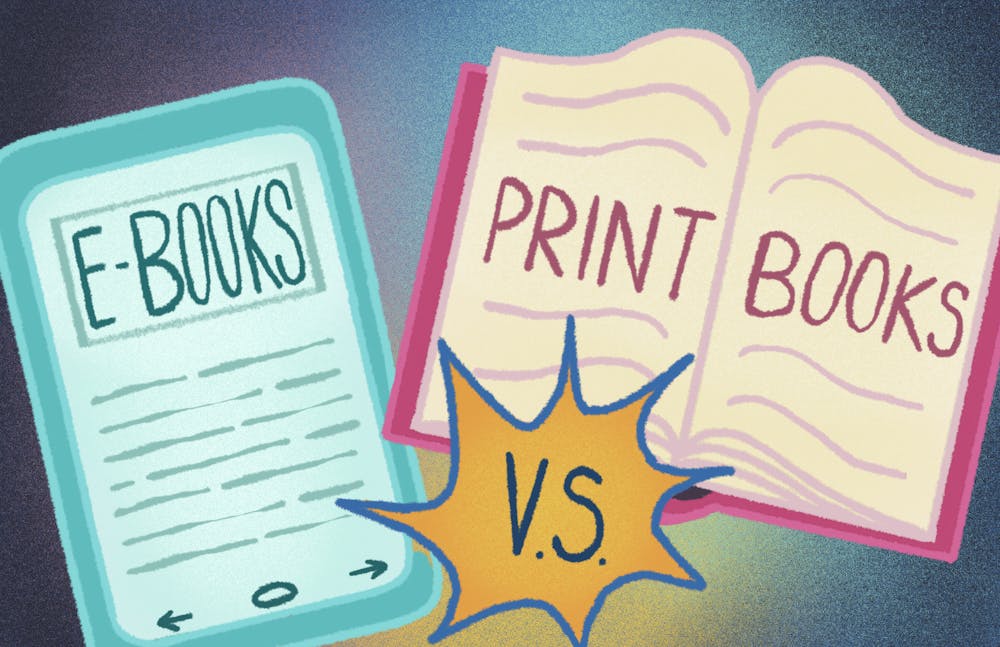When I was younger, I read books as often as I could. I used to love going to Barnes and Noble and bargaining with my mom on how many books I could buy – completely ignoring her comments on the dozens of books in my room that I hadn’t read yet.
As I grew up, I started to lean toward reading on my phone or Kindle Fire. While I still like to wander around bookstores, I end up reading most books online.
While I admit that I used to prefer printed books growing up, I realized e-books are more convenient in terms of cost, accessibility and resourcefulness.
Alexis Willis, a fourth-year student at Western Washington University, also had a change of heart toward e-books. Growing up, Willis was fixated on growing their physical book collection and spent a lot of money at bookstores.
“I feel like spending so much money to have some physical collection wasn’t as worth it,” Willis said. “I had so many books that I’ve never read and I’m not sure if I’m going to read.”
I’ve lost track of the amount of physical books I’ve bought that ended up collecting dust on my shelf. On the other hand, e-books are flexible and cheap when it comes to picking out books.
Even getting textbooks and required texts for classes online can be a better financial option for students.
“I’m teaching a class this quarter where there are two textbooks. Both are free online,” said Aran Clauson, a computer science instructor at Western. “It’s up to [the students] if they wanna purchase a copy… there’s no cost for the [online textbook] itself.”
I’ve been able to find the majority of my textbooks online for significantly cheaper prices than buying a physical copy through the Western Associated Students Bookstore or a different website like Amazon.
If you’re indecisive, it saves you money to just look for books online.
“I think e-books are a great way to read books without the pressure of having to buy a paperback,” Willis said. “With e-books, it’s a little bit easier to rent or buy a book and feel like you’re actually going to read it.”
E-books are also significantly easier to travel with. Eva Kuznetsov, a first-year at Western, uses e-readers because of their shape and storage.
“It’s nice just having a wide selection,” Kuznetsov said. “Especially if you’re going somewhere and you need something with you lighter and smaller.”
I would always download some books onto my phone and read them while flying to go on vacation or on long road trips with my family to pass the time. If I didn’t have an e-book, I probably wouldn’t have even bothered to bring a physical book.
Adding on, e-books have built-in accessibility features for students with disabilities, like screen reader compatibility and customizable displays.
“Print texts can be converted to digital format via the Disability Access Center, for students who have requested accommodations,” said Joanna Bailey, the Western Libraries course reserve manager. “In some cases, the library can convert print texts to digital for use on course reserve.”
Despite e-books’ resourcefulness and flexibility, I understand how mentally retaining material from online books can be harder than a physical copy.
Naomi S. Baron, a professor emerita of linguistics at American University, studies how learning is impacted by electronic communication compared to traditional print. In an article, Baron explained that reading on paper is better for students to comprehend information than digital books, audio and podcasts.
“With paper, there is a literal laying on of hands, along with the visual geography of distinct pages,” Baron said. “People often link their memory of what they’ve read to how far into the book it was or where it was on the page.”
According to Baron and reading researchers, the “shallowing hypothesis” states how people approach digital texts with a mindset suited to casual social media and devote less mental effort than when they are reading print.
While I see how reading print benefits a student’s learning, the bigger issue is that print is too costly and inaccessible. Several people in my classes would read required textbooks online because it’s both easier to obtain and cheaper financially. Adding on, a lot of students don’t like physical books simply because they take up too much physical space in comparison to online textbooks being transported digitally.
If students aren’t even getting physical textbooks for their classes, I think the most important thing at this point is getting them to read the book in general – whether online or printed.
Who cares whether print is best for learning if students aren’t reading at all?
E-book’s accessibility encourages people to read, which is ultimately what’s most important.
As Willis states, e-books give people the opportunity to read books on their phones or devices rather than having to buy physical copies.
“I feel like sometimes there's a lot of over-conception [about paperback books],” Willis said. “I think that e-books are a great way to read books without the pressure of having to buy a paperback.”
Jordan Brotamonte (she/her) is an opinions reporter for The Front this quarter. In her free time, she skis, takes photographs, and spends most of her time trying new coffee shops around Bellingham or exploring new places outdoors. You can reach her at jordanbrotamonte.thefront@gmail.com.






